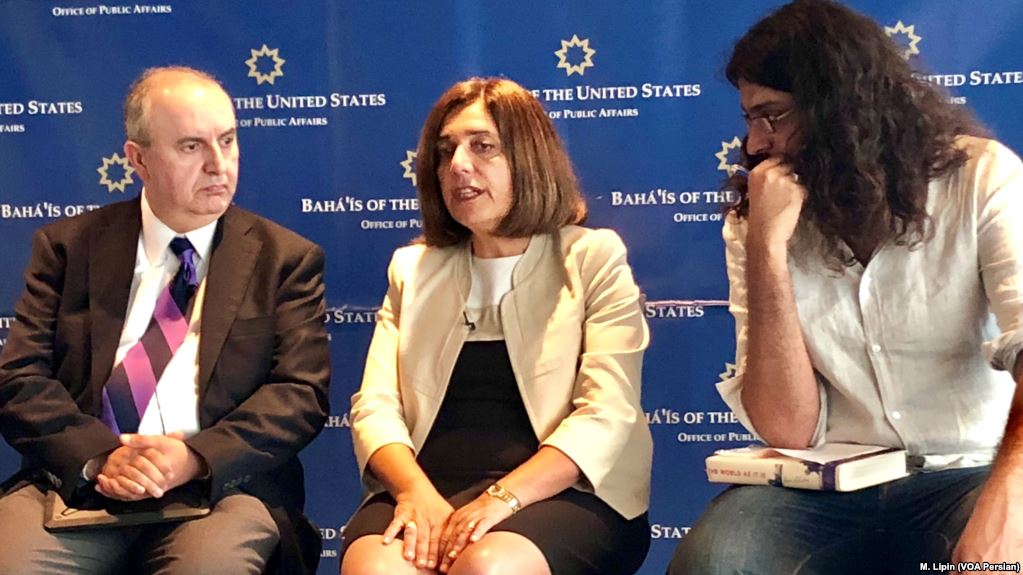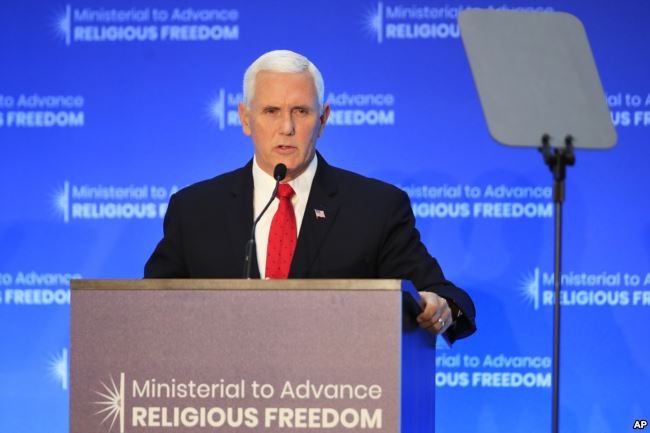Source: www.voanews.com

A Baha’i International Community representative who participated in a first-of-its-kind U.S. conference on religious freedom says she urged delegates to press Iran to stop mistreatment of its Baha’i minority.
Speaking to VOA Persian in Washington on Thursday at a conference-related event, Baha’i representative to the United Nations Diane Ala’i said Iran is susceptible to outside pressure on the issue.
“What is important is to pressure Iran to abide by its (human rights) commitments,” Ala’i said. Iran is a signatory to the International Covenant on Civil and Political Rights, which says: “No one shall be subject to coercion which would impair his freedom to have or to adopt a religion or belief of his choice.”
Baha’is have reported decades of discrimination and harsh treatment of their community in Iran, whose Islamist rulers refuse to recognize them as having a religion and label them heretics. The Baha’i Faith, a global religion whose leaders say has 5 million followers, originated in Iran in the mid-19th century. Community leaders say about 300,000 Baha’is live in Iran, constituting its largest religious minority.
Ala’i, who is based in Geneva, said Iran’s long-running denials of Western accusations that it persecutes Baha’is shows that it realizes such mistreatment is a bad thing.
“When Mohammad Javad Larijani (secretary of Iran’s High Council for Human Rights) comes to the U.N. Human Rights Council in Geneva, he does not say, ‘yes, we imprison Bahai’s and we do not care (what you think),’” Ala’i said. “Larijani says Iran gives Bahai’s freedom and they do not have any problems. So more pressure should be put on the Iranian government to do something to prove that there are no problems for Baha’is.”
At an assessment of Iran’s human rights record at the Geneva-based council in October 2014, Larijani said Baha’is are a “minority … who enjoy all the privileges of any citizen in Iran.”
A group of more than 20 international legal scholars wrote an open letter to Larijani earlier this year saying a recently launched online archive, containing thousands of documents of alleged human rights abuses against Bahai’s in Iran, presents a “different story.”
Ala’i said the three-day U.S. State Department ministerial conference that ended Thursday was noteworthy for delegates of many governments committing themselves to promote religious freedom at home and abroad.
“If there is a great movement of all of these countries to speak out for religious freedom in all parts of the world including in Iran and including for the Bahai’s, it will have an effect,” she said.
Earlier Thursday, Ala’i attended a conference speech by U.S. Vice President Mike Pence, who said Iranian Christians, Jews, Sunnis, Baha’is and members of other minority religious groups are denied what he called “the most basic rights” enjoyed by Iran’s Shiite majority.
“They are routinely fined, flogged, arrested, assaulted, and even killed,” Pence said. The Baha’i International Community reported 67 Baha’is were imprisoned in Iran as of Thursday.

The U.S. vice president also had a message for the Iranian people:
“Even as we stand strong against the threats and malign actions of your leaders in Tehran, know that we are with you. We pray for you. And we urge you, the good people of Iran, to press on with courage in the cause of freedom and a peaceful future for your people,” he said.
Asked what she thought of Pence’s message, Ala’i said Iran’s Baha’is are fighting for their rights peacefully.
“They are not using the same tools as their oppressors, but at the same time, they are not giving in,” she said. “They are trying to contribute to the betterment of society and to resist and to take cases through the courts.”
Ala’i spoke to VOA Persian at a Washington Newseum event organized by the Bahai’s of the United States and the Religious Freedom Center of the Freedom Forum Institute, a nonprofit group that runs the museum.
The event included a U.S. premier screening of a 30-minute documentary film The Cost of Discrimination, which draws comparisons between discrimination against Baha’is in Iran and discrimination against nonwhites in South Africa during its apartheid era. After the film, a panel discussed the plight of Baha’is in Iran and the region.
As part of the panel discussion, Ala’i gave an update of the situation of Baha’is in Yemen, where Iran-backed Houthi rebels have jailed six Yemeni Bahai’s in the capital, Sanaa, a city held by the rebels.
Ala’i said three of the detained Baha’is have faced charges for practicing their faith. One of them, Hamid Haydara, has been sentenced to death. She said the other three have not been charged.
“I hope that the international community will put pressure on the Houthis to release the six Bahai’s, because they have not committed any crimes,” Ala’i said.
This report was produced in collaboration with VOA’s Persian Service.
_____
Michael covers international news for VOA on the web, radio and TV, specializing in the Middle East and East Asia Pacific. Follow him on Twitter @Michael_Lipin
Leave a Reply